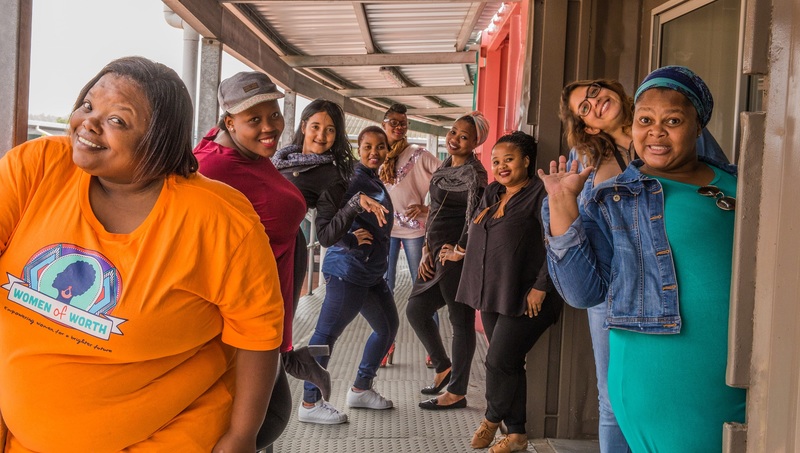Care, empowerment harnessed to reduce HIV infection
16 May 2017 | Story Helen Swingler. Photo Tyler Golato.
They’re young and female, the South Africans most at risk of getting HIV. But an empowerment project aims to change that through a year-long series of workshops providing care and life skills that build resilience and capacity.
Care, empowerment and incentives; it’s all wrapped up in the Women of Worth social and healthcare programme, launched on 3 May, that targets 10 000 women aged between 19 and 24 in the Mitchell’s Plain/Klipfontein district. The aim is to enrol 5 000 women this year and 5 000 next year.
This is the demographic group with the highest risk of contracting HIV. According to the UNAIDS Prevention Gap Report 2016, in sub-Saharan Africa (where 85% of young people with HIV live), there were approximately 4 500 new HIV infections among young women (15 to 24 years) every week in 2015, double the number seen in young men.
In South Africa, women between 19 and 24 are six times more likely to become infected with HIV than their male counterparts. Phylogenetic maps of the infection and transmission network also show that many of these young women are being infected by men who are an average of eight years older than they are.
The project sees empowerment and care as key to breaking this cycle, which is perpetuated by high unemployment in this group, fed by high school dropout and low levels of tertiary education. As a result, these young women have fewer economic opportunities and experience high rates of unwanted pregnancies. This also occurs in a context of regressive gender norms and high levels of gender-based violence.
“These young women are an ideal target for a preventive intervention,” said Carey Pike of the Desmond Tutu Foundation, affiliated with UCT’s Desmond Tutu HIV Centre in UCT’s Institute for Infectious Disease and Molecular Medicine. The Women of Worth component is being implemented by the foundation, in partnership with the Western Cape government and the Global Fund to Fight AIDS, Tuberculosis and Malaria.
“If we can empower these women financially, mentally and sexually then they will be less susceptible to becoming infected.”
Watershed project
The team hopes the Women of Worth project will be a watershed in reducing HIV infection rates in this group.
The project is part of Zimele, a broader, three-pronged national programme that is targeting 22 000 women and girls, in and out of school. Zimele has three aims: to reduce new HIV infections in young women and girls; keep girls in school until graduation; and decrease unintended teenage pregnancy.
“Reaching these young women is vital to uplifting the community and benefiting the next generation,” said Pike.
To effect this, Women of Worth offers a series of 12 free, once-monthly workshops run by trained facilitators. It addresses a range of biomedical, socio-behavioural and reproductive health aspects that impact on well-being in this target group.
The goal is to decrease HIV incidence and unintended pregnancy by enhancing the young women’s economic abilities, opportunities and job-seeking skills by linking them to proper training facilities. This will prepare them for the job market and for tailored healthcare services.
As the Desmond Tutu HIV Foundation already runs HIV/AIDS studies and initiatives in the Mitchell’s Plain/Klipfontein health sub-district, it was a natural place to start. To recruit women, the team tapped into existing church and community clubs, choosing central venues known to be easily accessible, safe spaces.
Interactive, peer-led
The format of the workshops is important: fostering engagement and interactive, peer-led discussion.
“The workshops follow a simple outline; this is not going back to school,” said Pike. “We don’t want it to resemble a life orientation lesson. But we know that information is not enough – you must build knowledge and a support network. There’s more to empowerment than putting across information in a didactic way.”
For example, one session goes by the title of Choose Your Poison and it’s about decision-making and risk theory, with games and videos that provide points for discussion. The session on contraception is called Contraceptive Chemistry. Participants wear lab coats and conduct a small experiment that demonstrates how contraceptives work.
Incentive and care protocol
Although care and empowerment are the main incentives of the Women of Worth project, there is another facet that is being explored. One of the cohorts of 5 000 participants will also receive a monthly cash incentive, a condition of attending and completing the sessions.
Incentive and care protocols have been used extensively throughout Africa but not much in South Africa. Incentives can be cash, school fees or school uniforms, something that is conditional or unconditional for participants completing a programme.
Monitoring, evaluating and tracking the results of the project will be vital. At the end of the Zimele programme, the Desmond Tutu HIV Foundation will evaluate the impact of the combination of the interventions on HIV incidence, pregnancy and economic opportunities.
It’s one of the biggest projects the foundation has undertaken. The challenge, says Pike, will be to evaluate the project’s long-term impact. This impact will affect the broader community.
“By impacting on 10 000 women we hope there will be spill-over in two ways: to help other young women in the community; and as they are the mothers of the next generation (some are already mothers), we hope they will pass on their skills to their children to break the cycle of misinformation and low economic opportunities.”
 This work is licensed under a Creative Commons Attribution-NoDerivatives 4.0 International License.
This work is licensed under a Creative Commons Attribution-NoDerivatives 4.0 International License.
Please view the republishing articles page for more information.










